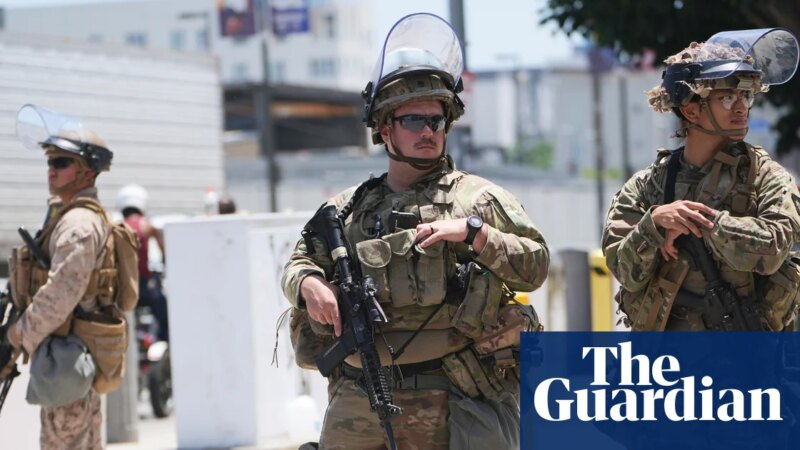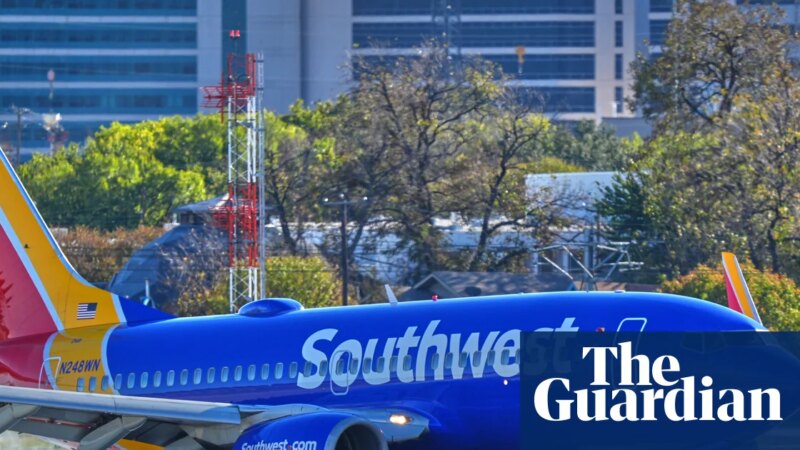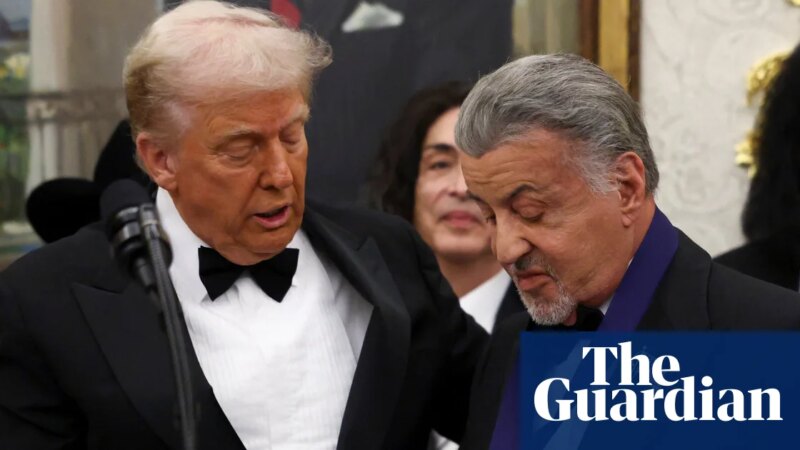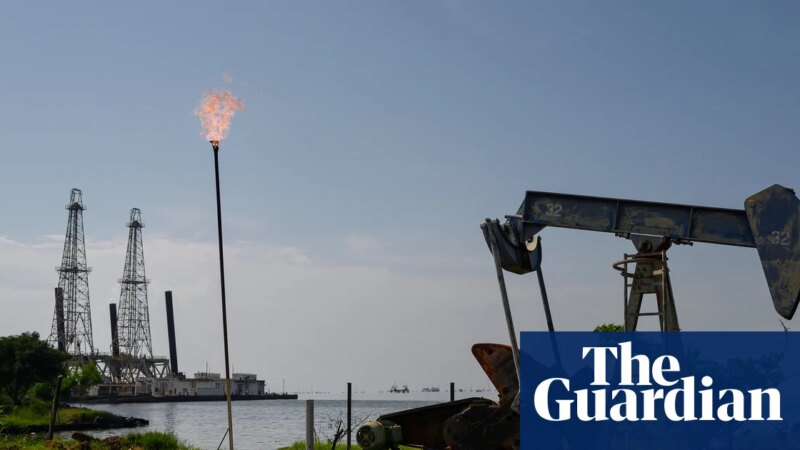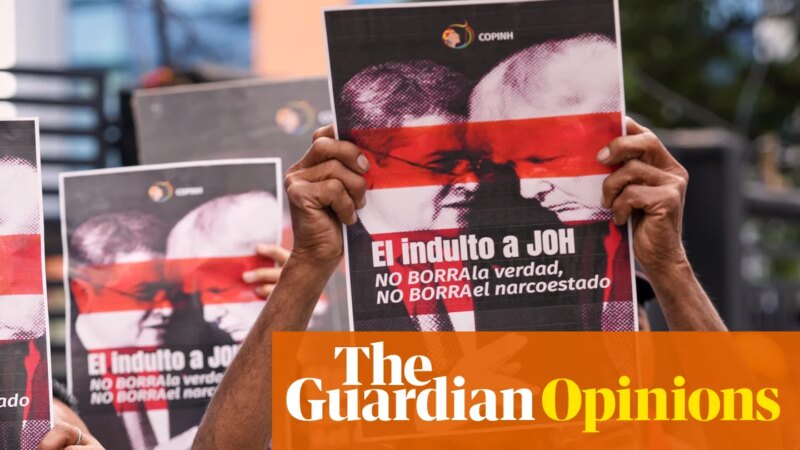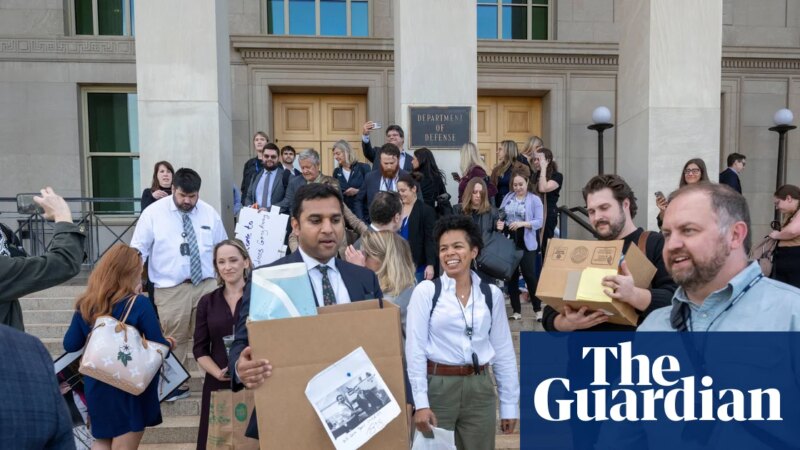Trump’s homeland security department announces New Orleans immigration operation – live | US immigration
‘We stand with you’: Minneapolis mayor supports Somali community
Minneapolis is home to the country’s largest Somali population, with about 80,000 living in the state. Most are US citizens or legal residents.
In response to Trump’s attack and the looming immigration crackdown reported, the city leaders held a press conference on Tuesday.
Mayor Jacob Frey said the city stands with its Somali community, delivering the message first in Somali and then in English.
“To our Somali community, we love you, we stand with you and we aren’t backing down,” he said. “That commitment is rock solid.”
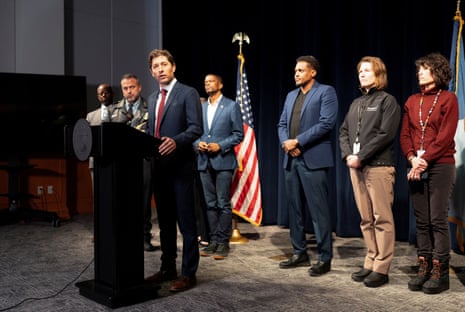
He condemned the plan to target people who just look like they could be from the East African nation, saying it violates basic principles of American democracy.
“Targeting Somali people means that due process will be violated, mistakes will be made, and let’s be clear, it means that American citizens will be detained for no other reason than they look Somali,” Frey said.
The city’s police chief has said that his department had not received advance notice of any operations, and besides, Minneapolis police do not assist federal agents with immigration enforcement.
Key events
DHS formally announces New Orleans immigration operation
The Department of Homeland Security (DHS) announced it had started its immigration enforcement operation in New Orleans today.
In a statement, the department said Operation Catahoula Crunch would target “criminal illegal aliens roaming free thanks to sanctuary policies”. New Orleans is the latest Democratic-run city (albeit in a Republican-led state) to see federal immigration agents on its streets. Most recently, the Trump administration targeted Charlotte, North Carolina, and touted the arrest of more than 300 undocumented immigrants.
Today, DHS spokesperson Tricia McLaughlin said that “it is asinine that these monsters were released back on to New Orleans streets to COMMIT MORE CRIMES and create more victims. Catahoula Crunch targets include violent criminals who were released after arrest for home invasion, armed robbery, grand theft auto and rape.”
Somali American councillor says ‘many families are fearful tonight’ but ‘Minneapolis stands with you’

Frances Mao
Jamal Osman, a Somali American city council member in Minneapolis, also spoke alongside Mayor Jacob Frey at last night’s press conference, delivering a message in both Somali and English to his worried community.
As reports spread on Tuesday that ICE agents were due to launch raids, he had visited affected neighbourhoods.
Osman said: “I know many families are fearful tonight, but the city stands behind you and we are here to stand with you.
“Our community has lived through fear in the past and we’re not going to let this divide us.”
He said city officials were doing everything so residents “know their rights, they know where to turn for help … Minneapolis will not abandon [you].”
He also said that everyone knew President Trump is “racist, xenophobic, Islamophobic” and “we are going to fight that. America has a history of fighting and stopping those kinds of individuals who continue to divide people and divide communities.”
“Many Somalis that live in this community are working, working at your groceries, working in your hospitals… they are successful individuals.”
The mayor and the city’s police chief also stressed that no local police would be involved in ICE operations.
Donald Trump is in Washington today. He’ll take part in the White House internship class photo at 10.30am ET, which is closed to the press.
Then he’ll make an announcement in the Oval Office at 2.30pm ET. We’ll bring you the key lines as it happens.
Tennessee special election takeaways
Voters may have elected Republican Matt Van Epps to fill the vacant seat in the state on Tuesday, but the single-digit win is being interpreted by some as a warning sign for the GOP ahead of midterms next year.
Trump won the district by 22 points last year, while Van Epps only won by nine points over Democrat Aftyn Behn – a secure lead but seen as underperforming. Behn ran an unapologetically progressive campaign in a seat viewed as safely red.
Democrats are now left wondering what could have been if they had run a more moderate candidate, while Republicans are counting the costs of an expensive race and the departure of some voters. The district’s former representative Mark Green won the seat by 21 points last year.
Van Epps’ win now pads out the Republican majority in the house to 220-214.
Trump and other senior officials had signalled tightening restrictions on immigration – it has been a flagship policy of his second term – but this was ramped up after the deadly shooting in Washington DC last week.
The main suspect in the shooting, which killed one, is an Afghan national who entered the United States during mass evacuations as US and foreign forces withdrew from Afghanistan in 2021.
He pleaded not guilty to murder charges on Tuesday.
The US Citizenship and Immigration Services memo said it “plays an instrumental role in preventing terrorists from seeking safe haven in the United States”.
The country had recently seen “what a lack of screening, vetting, and prioritizing expedient adjudications can do to the American people”, it added, citing the Afghan murder suspect.
Immigration halted for 19 countries
Trump had threatened the dramatic crackdown on immigration from the 19 already-targeted countries, following the shooting of two national guard members by an Afghan suspect last week.
He said he would “permanently pause migration from all Third World Countries to allow the US system to fully recover”.
The affected nations are: Afghanistan, Burundi, Chad, the Republic of Congo, Cuba, Equatorial Guinea, Eritrea, Haiti, Iran, Laos, Libya, Myanmar, Sierra Leone, Somalia, Sudan, Togo, Turkmenistan, Venezuela and Yemen.
They’re among the poorest in Africa, the Middle East and central and south-east Asia.
‘We stand with you’: Minneapolis mayor supports Somali community
Minneapolis is home to the country’s largest Somali population, with about 80,000 living in the state. Most are US citizens or legal residents.
In response to Trump’s attack and the looming immigration crackdown reported, the city leaders held a press conference on Tuesday.
Mayor Jacob Frey said the city stands with its Somali community, delivering the message first in Somali and then in English.
“To our Somali community, we love you, we stand with you and we aren’t backing down,” he said. “That commitment is rock solid.”
He condemned the plan to target people who just look like they could be from the East African nation, saying it violates basic principles of American democracy.
“Targeting Somali people means that due process will be violated, mistakes will be made, and let’s be clear, it means that American citizens will be detained for no other reason than they look Somali,” Frey said.
The city’s police chief has said that his department had not received advance notice of any operations, and besides, Minneapolis police do not assist federal agents with immigration enforcement.
ICE planning operations targeting Somalis -report
The New York Times reported on Tuesday that the Minneapolis-St Paul metro area, where most Somalis reside, would see stepped-up deportation efforts this week, focusing primarily on Somalis who have final deportation orders.
It would use “strike teams” of ICE agents and other federal officers, bringing in about 100 agents from across the country, the Times reported. Other media outlets, including the Associated Press, have confirmed the reporting.
The move comes after the right has seized on several fraud cases, spanning multiple years, that involve dozens of Somali residents who prosecutors allege lied to the state to receive reimbursements for meal disbursements, medical care, housing and autism services. The Trump administration previously threatened to revoke temporary protected status for Somalis in Minnesota, citing the state as a “hub of fraudulent money laundering activity”.
Scott Bessent, the treasury secretary, also announced on Monday that his agency would be investigating whether taxpayer dollars from Minnesotans had “been diverted to the terrorist organization Al-Shabaab”, sharing a recent story from a rightwing outlet that made such claims.
Trump attacks Somali immigrants and calls Ilhan Omar ‘garbage’

Rachel Leingang
In a cabinet meeting on Tuesday, Trump went off on Somalis and Ilhan Omar, the congressional representative who is from Somalia and is a US citizen. He said Somalia “stinks” and is “no good for a reason”.
“They contribute nothing. I don’t want them in our country, I’ll be honest with you,” he said. He called Omar “garbage” and said “we’re going to go the wrong way if we keep taking in garbage into our country”.
“These are people who do nothing but complain,” he said. “They complain, and from where they came from, they got nothing … When they come from hell and they complain and do nothing but bitch, we don’t want them in our country. Let them go back to where they came from and fix it.”
“His obsession with me is creepy,” Omar responded in a social media post. “I hope he gets the help he desperately needs.”
Welcome to US politics live
Good morning and welcome to our US Politics live blog, as we track the escalating attacks against immigrants being launched by the Trump administration.
Yesterday, President Trump called Somali immigrants “garbage” in a xenophobic rant in cabinet where he said “I don’t want them in our country” and they should “go back to where they came from”. It comes amid reports ICE agents are about to launch crackdowns targeting the Somali communities in Minnesota.
The Trump administration yesterday also halted all immigration for people from 19 nations – including Somalia, Afghanistan, Yemen and Haiti.
The 19 non-European countries have been under a partial travel ban since June – but this dramatic move brings to a halt all stages of the journey including green card and US citizenship processing.
It’s a move that affects countless people, and with no word as to how long the pause will last, it’s almost certain that families will remain separated for longer, in limbo.
I’m Frances Mao, stay with me as I take you through the key details.
